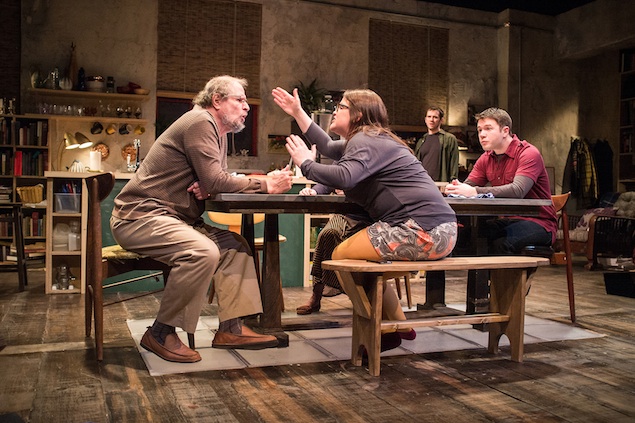
In a play as finely attuned to the cadences, nuances, and inflections of language as Nina Raine’s Tribes, things could be ruined in a heartbeat if a lone cast member’s English accent slipped for a second. Luckily, thanks to dialect coach Gary Logan, David Muse’s production is so authentically British, tea and cucumber sandwiches should be served at intermission. And though it may be early to say this, it’s probably one of the best shows Washington will see in 2014.
Tribes is a play about communication, filtered through the prism of an eccentric family of obnoxious intellectuals, one of whom, Billy (James Caverly), is deaf. His father (Michael Tolaydo), an academic who curses gleefully and accumulatively in the way only Brits can (he compares a bad seafood dinner to “being f*cked in the face by a crab”), has raised Billy to be “normal,” meaning he speaks no sign language and relies on lip reading. He also appears to be excluded from 75 percent of the bickering and casual cruelty the rest of the family indulge in.
Nancy Robinette plays Billy’s mother, a novelist who acts as peacemaker as much as possible while son Daniel (Richard Gallagher) and daughter Ruth (Annie Funke) go off at each other. Daniel is also an academic, and a presumable schizophrenic whose internal voices get louder and more aggressive as the show goes on; Ruth is a wannabe opera singer. Raine gives each sibling a trait to cast light on Billy’s condition, with Daniel trying to drown out the unwelcome speakers in his head and Ruth excelling in music, an art form Billy has no way of appreciating.
Muse directs the production toward hearing and non-hearing audiences, and finds ways to make both feel deliberately included and isolated: Three interpreters situated in the middle of the audience sign the actors’ words to the rows at the back, while visual soundwaves are projected onto the back of the stage when musical interludes punctuate scenes. When a snippet of opera plays, both the Italian words and their English translation are provided, along with bars from the sheet music. And when Billy meets a girl named Sylvia (Helen Cespedes) who helps teach him to sign, their conversations, too, are translated.
It’s this new and illuminating presence in his life that precipitates an ugly upheaval within his family. As much as it deals with how humans communicate and relate to one another, Tribes offers insight into how insular we are, packed into our tight little networks of families and alumni groups and book clubs and football games. When Billy’s family asks Sylvia what the deaf community is like, her response—“hierarchical”—nails our innate desire to categorize and define each other. Billy, who was born deaf, has instant caché but loses points for not knowing how to sign, while Sylvia, born hearing to deaf parents but gradually losing her own ability to hear, is lower down the ladder thanks to the fact that she hasn’t always been that way. When she astonishes Billy’s family by playing a piece of music on their piano almost flawlessly, they crowd around her and turn their backs on their own son in a simple, powerful piece of staging.
Caverly’s Billy does remarkable work eking out Billy’s frustrations and loneliness gradually until he explodes, silently, in a confrontation in which he steadfastly refuses to speak. A Gallaudet grad, Caverly communicates a lifetime of fury in Billy’s signed soliloquy, translated reluctantly for his family (and for the audience) by Sylvia. Cespedes has one of the hardest jobs portraying both sides of the play’s universe, speaking fluently and with an almost aristocratic confidence to Billy when she first meets him and signing poetry so emotively to Billy’s brother that the entire room falls silent.
Tolaydo, who was raised in the UK, offers the perfect depiction of an arrogant, infuriating, boorish patriarch who’s somehow sympathetic nonetheless. His conviction that Billy is better off existing outside of any deaf community (he calls the deaf “the f*cking Muslims of the handicapped world”) is so finite that Billy’s rebellion seems to shake him to the core. Robinette, as the funny, brave, but ultimately helpless Beth, suits being British so well that PBS should snap her up for a production, pronto.
Gallagher’s Daniel is one of the most problematic characters—the voices in his head seem to be clumsy and inefficient allegories that don’t offer as much from an audience perspective as the rest of Raine’s multifaceted script. Still, his furious fights with Funke’s hapless Ruth are enormous fun to watch, playing out amid a kitchen set by Wilson Chin upon which overburdened bookshelves threaten to spew books onto the stage and there are many different kinds of cutlery to be considered for a family dinner.
Tribes, which won the 2012 New York Drama Critics Circle Award for Best Play, is undoubtedly a funny and very thoughtful show, tackling heritage, identification, and disabilities of all kinds, from Billy’s inability to hear to his father’s inability to listen (and let’s not forget the dark, mystical force that somehow keeps all three adult children living with their parents). Muse not only distinguishes all these moving parts but also forces them together in a way that makes this production democratic, as well as deeply communicative.
Tribes is at Studio Theatre through February 23. Running time is about two hours and 20 minutes, including one intermission. Tickets ($39 to $75) are available via Studio’s website.
















